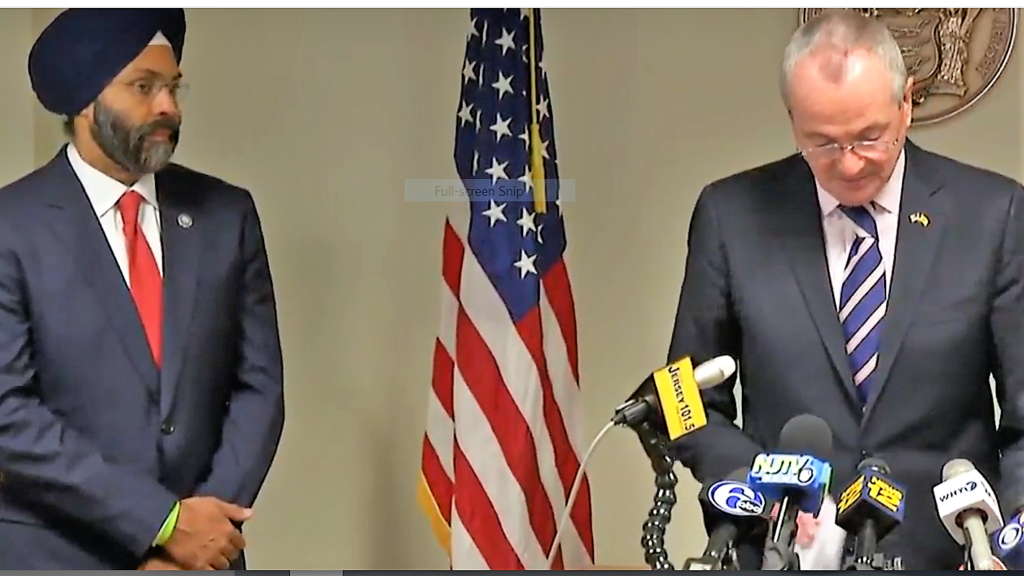AG Grewal Opposes EPA Plan to Roll Back Federal Clean Car Standards

AG Grewal Opposes EPA Plan to Roll Back Federal Clean Car Standards
TRENTON – Attorney General Gurbir S. Grewal and 20 other state Attorneys General today filed comments demanding that the U.S. Environmental Protection Agency (EPA) and National Highway Traffic Safety Administration (NHTSA) withdraw their proposal to eliminate the national Clean Car Standards.
In 2012, the Obama Administration adopted federal vehicle fuel economy standards, the Clean Car Standards, to combat greenhouse gas emissions. The standards reduce these emissions, help prevent the effects of climate change, and save consumers money in the process. But the Federal Government now plans to replace them with a new rule that will require no improvements in vehicle greenhouse gas emissions for at least six years.
“We already know New Jersey’s climate is changing, and with that comes the potential for more life-threatening storms like Superstorm Sandy,” Attorney General Grewal said. “It is time for Washington to step up to combat climate change, not fall down on the job. Unfortunately, EPA is relying on flawed science and flawed policy to cut back on our country’s clean car rules. The Administration is putting special interests above New Jersey, and is setting us years back in the fight against climate change. We already sued EPA once over this process, and if the Federal Government continues to recklessly roll back the clean car standards, we will take them to court again.”
“Motor vehicles are by far the single largest source of greenhouse gas emissions in New Jersey,” said Department of Environmental Protection Commissioner Catherine R. McCabe. “We will not stand idly by while the Trump Administration disassembles good policies and programs intended to fight climate change, an issue of great importance to the future of our state.”
In 2010, EPA and NHTSA announced new greenhouse gas emission standards and fuel efficiency standards. Two years later, the agencies extended the program to model years 2017-2025 vehicles. Those current Clean Car Standards are expected to prevent up to 2,000 premature deaths, 50,000 cases of respiratory ailments, and reduce asthma symptoms for the 24 million Americans, including 6.3 million children.The rule would save the average consumer $1,620 over the lifetime of a car or truck.
As part of the program, these agencies agreed to undertake a midterm evaluation to determine if these standards for model years 2022-2025 vehicles should be revised.On April 13, 2018, the Federal Government issued a revised final determination that alleged the federal greenhouse gas standards vehicles were no longer appropriate. In so doing, it failed to provide any relevant evidence for its decision, and so New Jersey joined a coalition of 16 other states and the District of Columbia in suing EPA on May 1, 2018. That case is still ongoing.
The Federal Government is moving forward with its plan anyway. In addition to rolling back national standards, EPA and NHTSA as proposing to revoke California’s and other states’ long-standing authority to maintain more stringent standards.
The letter calls on EPA and NHTSA to withdraw the proposal. After all, the coalition of Attorneys General point out, “the existing standards constitute a serious effort to reduce the pollution from vehicles that is a major contributor to climate change and to conserve energy, while providing automobile manufacturers significant flexibility and benefiting consumers’ pocketbooks.” But “EPA recklessly proposes to gut the primary emission reduction program for the United States’ single-largest sector for greenhouse gases.” Ultimately, the letter notes, “Slamming the brakes on reductions in greenhouse gas emissions from U.S. light-duty vehicles for over half a decade would deal the fight against climate change a substantial blow.”
Most worryingly, the letter adds, “the proposed rollback is unlawful.” First of all, “the Agencies are running their rulemaking in a manner that fails to comply with the Administrative Procedures Act—failing to fully disclose the data and assumptions that they have relied on.” Second, “the Agencies’ Proposal contravenes their mandates from Congress under the Clean Air Act” because they ignore their “weighty responsibilities to protect the public from air pollution and to conserve energy.” In reality, the letter goes on, “EPA’s apparent resignation to catastrophic climate change constitutes a wholesale abdication of its statutory obligations to the American people.” Finally, the letter explains, EPA and NHTSA have not “provided the good reasons required for their reversal of position on factual, technical or legal issues.”
The Attorneys General reiterate that “[t]he commitment of our States and Cities to reduce vehicle GHG emissions is longstanding and remains resolute.” To that end, the letter highlights, the states “have proven our ability to work cooperatively with the federal government and the automobile industry on vehicle GHG emissions standards.” But if the Government refuses to cooperate, the Attorneys General promise, “we will not stand idle when EPA or NHTSA flout their statutory obligations or act arbitrarily and capriciously, much less when the authority Congress granted the States in … the Clean Air Act is unjustly threatened.”
Participation in today’s multi-state comments letter is the latest action by Attorney General Grewal in the ongoing effort to safeguard New Jersey residents and combat climate change. In July, Attorney General Grewal joined other states in suing the EPA over its decision to suspend a rule limiting the production of super-polluting trucks known as “gliders.” The EPA subsequently backed off the planned action. In June, Attorney General Grewal also petitioned a federal court in D.C. to stop the EPA from allowing industrial use of chemicals known as hydrofluorocarbons (HFCs), an especially powerful greenhouse gas.






